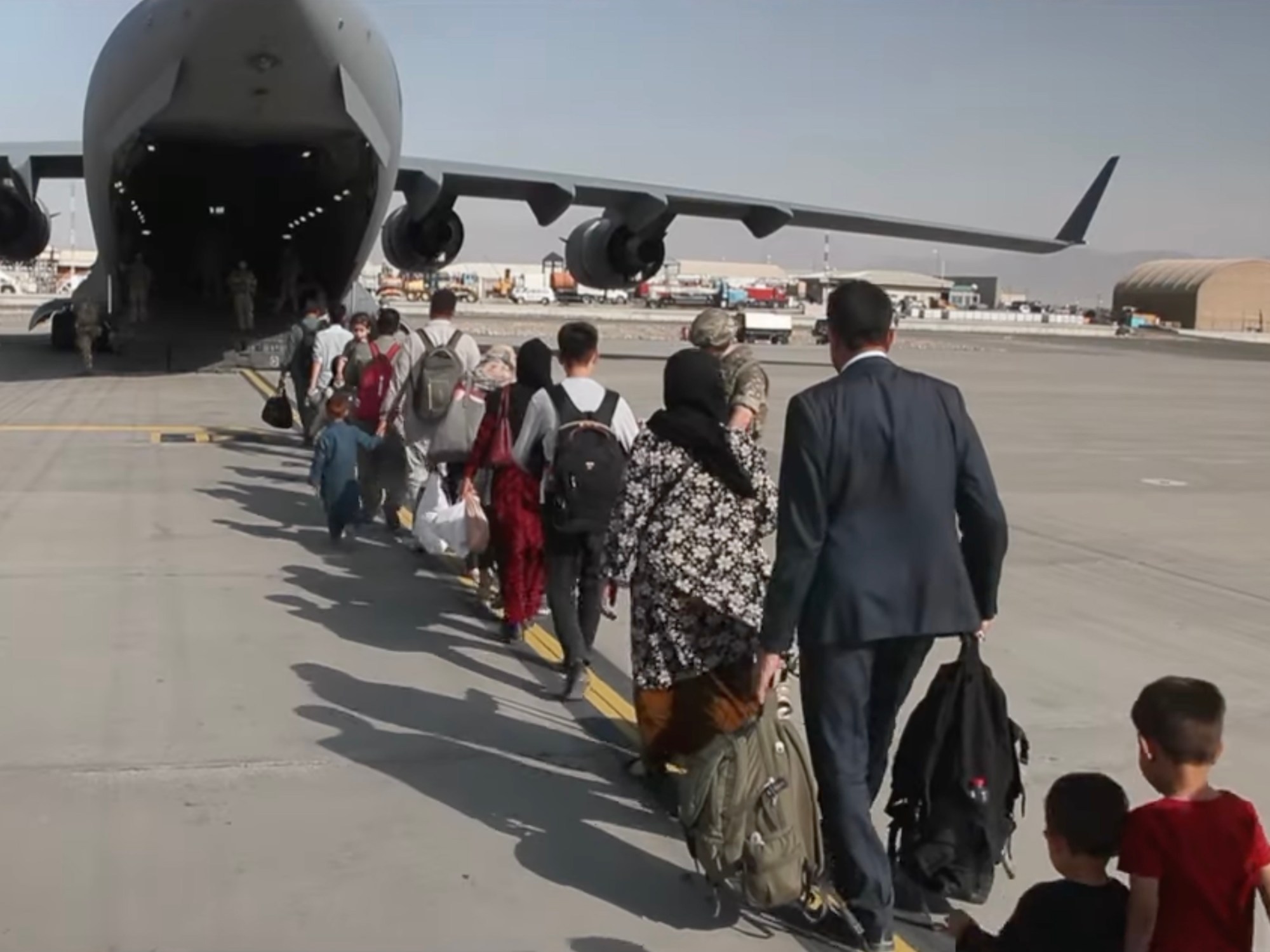
- Television
Docs: “Escape from Kabul” Details Harried Fall of Afghanistan
Directed by Jamie Roberts, the new documentary Escape from Kabul puts an emotional human face on the harrowing events of its title — a humanitarian disaster that unfolded in August 2021, during the last two weeks of American military forces on the ground in the Afghanistan capital.
Premiering September 21 on HBO and HBO Max, the movie assays the largest non-combatant evacuation airlift in modern history, with by some counts an estimated 124,000 panicked Afghan civilians eventually escaping, as one puts it, the impending “hell of judgment day” set to be imposed by a retributive and repressive regime returning to power two decades after having been driven out, in the aftermath of the September 11, 2001, terrorist attacks.
As the final chapter in the 20-year war between the Taliban and United States-led NATO forces, the fall of Kabul can be traced in a direct line to the binding U.S.-Taliban peace deal signed in February 2020 in Doha, Qatar. This established the parameters of a May 2021 deadline for withdrawal, later extended to the end of August after the change in American presidential administrations. But Escape from Kabul is not a movie about political machinations. It is instead driven by the twin engines of charged immediacy and poignant consideration, fusing on-the-ground footage with measured reflections.
Using as a frame the recollections of Lieutenant Colonel Christopher Richardella, the commanding officer of United States Marines on the ground, Escape from Kabul details a small contingent of American forces, around 150 strong, mobilizing and arriving in Kabul on August 13, without heavy equipment. Their mission was simple: secure Kabul’s airport, a joint military base and civilian structure from which departures from Afghanistan would be managed.
Two days later, as Taliban fighters overran porous Afghan military forces and the country’s president fled, all hell would break loose. On August 15, eight to 10,000 people rushed to the airport, easily breaching the perimeter; by the next day, the number would swell to more than 24,000 inside the airport. Many of these people had worked for years as translators or contractors with American forces, and now feared for the safety of themselves and their families. Both arrivals and departures would grind to a halt as Marines struggled to keep civilians off the tarmac.
Roberts has considerable experience with the incendiary intersection of politics and real-life chaos, having helmed last year’s Four Hours at the Capitol, which provided a first draft-of-history stab at the attempted January 6, 2021, insurrection by supporters of Donald Trump. That film served up a similar mixture of highly charged, handheld footage and after-the-fact interviews, with a tilt toward the former. Also, like Roberts’s previous movie, this is a film which makes clear it will present not necessarily contradictory information, but at least opinions and points of view that are sometimes in direct conflict.
Escape from Kabul doesn’t entirely default to a Western perspective. Among the many subjects are ordinary Afghans, some of whom escaped as refugees, and others who did not. It also includes a significant number of interviews with (understandably thrilled, from their perspective) Taliban figures, from commanders Mawlawi Samiullah Fateh and Abdul Hadi Hamdan to special forces fighters and other lower-level figures.
Roberts is not much interested in unpacking the reality of the fundamentalist group’s brutal and oppressive history (though Hasina Safi, Afghanistan’s Minister of Women’s Affairs, does relate a direct assassination threat communicated to her), and the Taliban doesn’t seem very inclined to ponder the nature of desperation from so many of their countrymen. Thus, Escape from Kabul places at the feet of viewers the moral dimensions of this jumbled, chaotic incident, leaving them free to draw their own conclusions about the actions of its participants.
Among the film’s memorable moments is United States Marine Corps Gunner William Callen recalling with emotional detachment a Taliban belligerent felled with “one clean shot.” There’s Muslim Hotak, a student who recounts witnessing a mother leave behind dead children and exhorting her remaining family to press on. There’s news anchor Shabnam Dawran, plus other young female students and businesswomen, speaking to the lie of the Taliban’s press conference promise to “uphold women’s rights under Sharia law.” There’s footage (from a considerable distance) of people who clung to the outside of a C-17 military transport plane upon its takeoff falling to their deaths. And there are stories of an Afghan military unit which shows up and offers “assistance” in clearing the airport in the form of simply running over and killing people.
As Escape from Kabul builds to its climax, abetted by a simple but involving score from composer David Schweitzer, Roberts uses these individual tragedies as building blocks to create a more complicated but no less haunting mosaic. As the American military resorts to flash-bangs and rubber bullets to guarantee perimeter security — and an August 26 attack by ISIS kills 170 Afghans and 13 Americans, curtailing evacuations — one’s heart is swollen with the ripe injustice of this world. Escape from Kabul is a distressing reminder that the most vulnerable amongst us too often bear outsized consequences for calamities both natural and sadly foreseeable.

